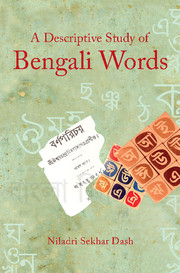Book contents
- Frontmatter
- Dedication
- Contents
- List of Tables
- Bengali Vowel Sounds in Cardinal Diagram
- Preface
- Acknowledgements
- Chapter I Word: A Conceptual Complexity
- Chapter II Usage of Some Word-formative Elements in Bengali
- Chapter III Frequency of Use of Words in Bengali
- Chapter IV Structural Components of Bengali Words
- Chapter V Use of Affixes with Bengali Words
- Chapter VI Postpositions Used in Bengali
- Chapter VII Compound Nouns and Adjectives
- Chapter VIII Structure of Reduplicated Forms in Bengali
- Chapter IX Lexical Naturalization in Bengali
- Appendix I
- Appendix II
- Appendix III
- Appendix IV
- Appendix V
- Appendix VI
- Appendix VII
- Bibliography
- Author Index
- Subject Index
Chapter I - Word: A Conceptual Complexity
Published online by Cambridge University Press: 18 December 2014
- Frontmatter
- Dedication
- Contents
- List of Tables
- Bengali Vowel Sounds in Cardinal Diagram
- Preface
- Acknowledgements
- Chapter I Word: A Conceptual Complexity
- Chapter II Usage of Some Word-formative Elements in Bengali
- Chapter III Frequency of Use of Words in Bengali
- Chapter IV Structural Components of Bengali Words
- Chapter V Use of Affixes with Bengali Words
- Chapter VI Postpositions Used in Bengali
- Chapter VII Compound Nouns and Adjectives
- Chapter VIII Structure of Reduplicated Forms in Bengali
- Chapter IX Lexical Naturalization in Bengali
- Appendix I
- Appendix II
- Appendix III
- Appendix IV
- Appendix V
- Appendix VI
- Appendix VII
- Bibliography
- Author Index
- Subject Index
Summary
Introduction
In linguistics, the term ‘word’ is a conceptual enigma. Although linguistically it is treated as one of the fundamental compositional units of a language, in the history of linguistics, the independent identity of a word has often been questioned, challenged or ignored. Scholars of linguistics have been often reluctant to acknowledge the separate linguistic identity of words because of their varied surface forms and functions within a piece of text.
This leads Matthews (1974) to argue that it is not a word, but a morpheme, which is important in establishing relation of a word with phonology, syntax and semantics. Aronoff (1981) also ignores the separate identity of word as he considers word as nothing but a phonetic string, which is connected to other linguistic entities lying outside the string.
Selkirk (1983), on the other hand, treats word from a purely syntactic point of view as she identifies a set of word formation rules, which are applied to generate words. Bybee (1985) interlinks words with morphology to argue that a word should never be studied free from its meaning, as the meaning of morphemes and contexts determine several linguistic properties used in formal expression of words.
Jensen (1990) argues that it is not words but morphemes, which are primary structural units, and which are typically but not necessarily meaningful. Therefore, it is sensible to focus on morphemes rather than on words in word formation. Spencer (1991) tries to build up an interface that underlies between morphology and phonology to understand linguistic entity of words. His basic idea of word includes inflectional morphology with an underlying interface between syntax and morphology by which one can explore the processes involved in word formation.
In essence, word is a complex linguistic concept, which is difficult to define in straight terms. Citing different examples from various languages as well as observations of various experts of the field, it can be argued that the concept of word is actually interlinked with several linguistic issues such as, pronunciation, lexicology, orthography, morphology, grammar, meaning, derivation, inflection, convention, usage, etc. which directly or indirectly play crucial roles in identification of words in a natural language.
- Type
- Chapter
- Information
- A Descriptive Study of Bengali Words , pp. 1 - 32Publisher: Cambridge University PressPrint publication year: 2015



